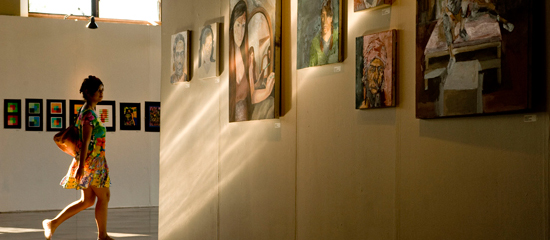
I wanted to let you know what I have been up to and where I see the College of Fine Arts going as we enter 2011.
This year began at full speed with classes, rehearsals, exhibitions and performances going on all over the College and University. You can review many of the events I attended on this blog. A myriad of remarkable events closed 2010, among them, a visit by Geena Davis (CFA ’79, Hon. ‘99), who brilliantly discussed her career and work on the largest research project ever undertaken on gender in children’s entertainment. It was wonderful to have her back at BU.
Two performing arts associations, the International Society for the Performing Arts (ISPA) and the Association of Performing Arts Presenters (APAP) held their annual conferences back to back in New York during the first ten days of January. The buzz words there were “collaboration” and “vision 2021”. These two themes are at the core of our current strategic planning process at CFA, and it is very pertinent to discuss them both within our community at BU and with world leaders in the arts.
One such leader I encountered in New York was Akram Khan, one of the most acclaimed choreographers in Britain today. His dance company has provided him with a platform for innovation and a diverse range of work through collaboration with artists from other disciplines. His latest project, Vertical Road, has attracted a host of performers from east and west to collaborate with him. Ballerina Sylvie Guillem, actor Juliette Binoche, composer Steve Reich and artist Antony Gromley are among his collaborators, and it was fantastic to hear about his experiences with the risks, opportunities and rewards of artistic collaboration, especially for me, since collaboration is the very reason for the existence of a College of Fine Arts at BU.
Among the many meetings and interactions at and around these conferences was a get-together with the violinist Aaron Dworkin, a friend of BU, who has sent many students to Boston University Tanglewood Institute, our summer music program in Lenox, MA. Aaron was named a 2005 MacArthur Fellow, is a member of President Obama’s National Arts Policy Committee and was the President’s first nominee to the National Council on the Arts; he is also founder and President of the Sphinx Organization, a leading national arts organization that focuses on youth development and diversity in classical music. An author, social entrepreneur, artist-citizen and an avid arts education advocate, Aaron is a great example of how a virtuoso musician can also be a social leader and the best possible advocate for his art.
To succeed, Aaron has had to develop what we might call social entrepreneurial skills – skills that can be learned and taught, and which are at the core of the vision that is emerging in our strategic planning discussions. I have also found the roots of such social entrepreneurial teaching in some of the writings of Eben Tourjée, founder of the original College of Music at BU in 1872. In order to clarify a relevant vision for the future, we must carefully trace our history and remember the lessons learned along the way.
These two examples of collaboration and social responsibility come hand in hand with excellence in the artistic training of our students, who will face a challenging and uncertain future. It is our mission to provide the best possible tools for them to be relevant, resilient and, yes, successful, although in my choice of this word, I urge everyone to create their own definition of what “successful” really means.
The arts are the perfect space in which to face complex issues and to collaborate. My final thoughts go to my meetings with my friend Alan Brown, a leading expert on audience participation in the arts. We talked of many things, but of capital importance is the Creative Campus initiative, whose purpose is to develop cross-campus interdisciplinary collaborations that integrate the arts into both the academy and the surrounding community, in
order to further develop the role and influence of the arts within the education, service, and scholarly missions of the university.
We hope to engage chief academic officers in helping us to create opportunities to deepen and expand the participation of artists in the academy through long term residencies, commissions and/or other creative activities. Along the way, we must identify, document, and share lessons learned that will contribute to an evolving knowledge base and learning community for campuses, as well as the performing arts world. We have begun the necessary conversations toward establishing BU as a most creative campus, one that shares the arts with its community, city, and world.
We fully embrace our role at the forefront of global knowledge creation and collaboration.
